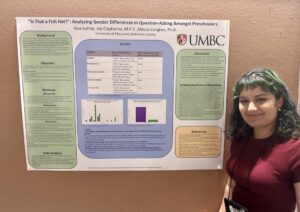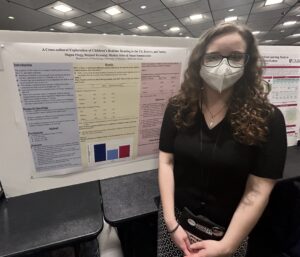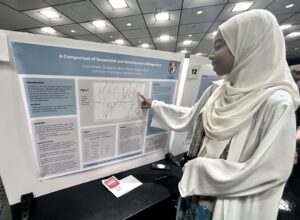Students may apply to work with faculty as volunteers or for course credit through PSYC 397. Please email faculty directly to inquire about the availability of research opportunities for a particular semester and additional details about the research experience.
Students are encouraged to reach out to faculty members several months in advance.



Dr. Diane Alonso (Shady Grove Campus)
Merging Cognitive Psychology with Computer Science/Human Computer Interaction to implement best practices in technology, teamwork, and education. Two primary focus areas are (1) studying how to effectively integrate technology into the classroom and (2) exploring mechanisms to promote interdisciplinary, inter-institutional, and interprofessional experiences in education.
Student Activities: Specifically for students who are enrolled in the psychology program at the Universities at Shady Grove (USG) campus in Rockville, MD: Internships (PSYC 398), Independent Research in Psychology (PSYC 490) and Honors Thesis Research (PSYC 498 and 499H). For the research courses, qualified students, who have successfully completed PSYC 312 (Research Methods in Psychology II) will design, develop, deploy, and analyze data from an experiment. They will also present their findings at conferences and prepare a manuscript for publication.
Contact: dalonso@umbc.edu
Dr. Billingsley’s research focuses on the study of normative and adaptive processes fostering healthy development among African American adolescents facing contextual adversity. She utilizes qualitative and mixed-method approaches to uncover how African American adolescents can leverage pre-existing strengths in their lives, such as supportive intergenerational familial bonds, to promote their social-emotional well-being. Additionally, Dr. Billingsley’s work examines sociocultural influences on African American adolescents’ social-emotional development and also considers how African American youth understand and respond to their social environments.
Lab Website: Youth Rise: The Youth Resilience, Intergenerational Supports, and Engagement Lab
Behavioral applications to response allocation of college undergraduates, persons with intellectual disabilities, and typically developing young children.
Student Activities: Interacting with participants, Working with data (collecting, scoring/coding, entering, and analysis), Conducting literature reviews, Discussing research, Assisting with manuscript preparation
Undergraduates interested in joining Dr. Borrero’s team must have completed PSYC 210.
Contact: jborrero@umbc.edu
The overarching theme of my research is the development of effective procedures to enhance learning in individuals with Autism Spectrum Disorder (ASD) and other developmental disabilities. I am specifically interested in variables that influence language development and other complex skills (e.g., concept formation), as well as functional assessment and treatment of problem behavior. We currently have several ongoing studies with children with ASD. Undergraduate students help with coding data, analyzing data, conducting literature reviews, preparing manuscripts for publication, and preparing presentations for conferences. Several undergraduate students in my lab received undergraduate research awards and completed honors theses.
Student Activities: Interacting with participants, Working with data (collecting, scoring/coding, entering, and analysis), Conducting literature reviews, Discussing research, Preparing and presenting posters, Assisting with manuscript preparation
Contact: cengher@umbc.edu
The impact of culture on socialization processes and the social- emotional, psychological, and physical health and development of children, adolescents, and emerging adults. Research focuses on immigrant, ethnic and/or religious minority groups in the U.S. (e.g., Asian immigrants, Muslim-American adolescents) and cross-cultural comparisons internationally (e.g., China, Japan, Taiwan, Malaysia, Turkey, Italy).
Student Activities : Research design, data collection (interviewing parents, children, adolescents), questionnaire assessments, observations of behaviors, experiments with children), data entry and management, library research, involvement in conference presentations and manuscript publications, and attending research team meetings.
Contact: ccheah@umbc.edu
Understanding the effects of PTSD and trauma-related psychopathology on survivors’ family relationships; identifying and promoting sources of strength and resilience among individuals coping with trauma-related distress
Student Activities: Recruiting families to participate in studies involving interviews, questionnaires, and daily diary assessment; administering components of study protocol to participants; assisting with literature reviews; data entry, coding and data analysis
Interested students should e-mail Dr. Franz to arrange for an interview. Please include your unofficial transcript and resume.
Lab Website: The Family Adversity Lab
Contact: mfranz@umbc.edu
Examines interrelations among biopsychosocial factors and cardiometabolic health and disease. Specifically, research at the interface of cardiometabolic disease risk (e.g., diabetes, cardiovascular disease, metabolic syndrome), aging, cognition, psychosocial and biobehavioral factors, and health disparities. Examines: (1) psychosocial (e.g., depression and anxiety symptoms, subtypes and disorders, socioeconomic status) and cognitive risk factors for the development of diabetes- and dementia-related outcomes, (2) biobehavioral mechanisms that underlie these associations; and (3) psychosocial factors that contribute to racial/ethnic disparities in cardiometabolic disease, focusing on Hispanic/Latino and African American populations.
Study Activities: Active participation in data collection on campus and downtown (Baltimore VA); Data management and entry; literature reviews and presentation of the same; conference presentations and manuscript preparation; attending research team meetings.
Lab Website: CACHE Lab: Cognition, Affect, and Cardiometabolic Health Lab
Contact: khambaty@umbc.edu
Dr. Donald Knight (Shady Grove Campus)
Cultural psychological constructs, including but not limited to: research mentoring of minority doctoral students in professional psychology; minority men, masculinity and father absence issues; and cultural competency/humility in applied clinical work.
Contact: dknigh1@umbc.edu
Dr. Elliot Lasson (Shady Grove Campus)
Generational differences in the workforce, employment interviewing, career progression, performance management, social media and employment; digital technologies and boundaries, personality and integrity assessment.
Student Activities: academic advisement, career coaching to facilitate internships and job opportunities in I/O and HR, resume advisory, mock interviews, sharing job leads, professional network integration.
Contact: elasson@umbc.edu
There are no specific course requirements to work with our team, and students are encouraged to apply early in their program of studies (as freshmen or sophomores). Preference is given to Psychology majors and students with a GPA above 3.0.
Opportunities are specific to prevention and treatment of abuse and violence in intimate adult relationships. Example topics include the efficacy of prevention programs for gender-based violence, treatments for individuals who engage in intimate partner abuse, and the role of trauma in abuse perpetration.
Student Activities: Literature searches, data management, data coding, internship experiences at domestic violence agencies, analysis of archival data from clinical studies.
Contact: chmurphy@umbc.edu
Contact: nnawulez@umbc.edu
Evaluation and application of emerging analytical techniques, particularly as pertaining to longitudinal data analysis; risk and protective factors of young adult substance abuse, developmentally limited alcoholism, and intergenerational transmission of substance abusedisorders.
Student Activities: Interviewing participants, data entry and analysis, literature review, aspects of research development and design.
Contact: spitts@umbc.edu
Biopsychosocial factors that affect pain perception and lead to disparities in chronic pain based on gender, ethnicity, and age. The use of neuroimaging to study the underlying neural mechanisms by which these factors influence pain processing in the brain. Current projects focus on biological factors such as sex and age; psychological factors such as optimism and emotion regulation;and socio cultural factors such as social isolation, ethnic identity, and discrimination. Collaborative projects include studies of the neural mechanisms of chronic migraine and of ethnic disparities in comorbid pain and PTSD.
Student Activities: Research participant recruitment and scheduling, data collection (questionnaires, sensory testing, neuroimaging), data entry and statistical analysis, library research, literature review writing, and opportunity to be involved in independent research projects that may lead to conference presentations and manuscript publications.
Contact: rquiton1@umbc.edu
Dr. Pamela Rakhshan Rouhakhtar
Dr. Rakhshan Rouhakhtar’s research interests include validation and development of psychosis spectrum assessments, application of advanced quantitative methods in the study of early psychosis assessment, and studying the role of environmental and psychosocial factors in our understanding of the psychosis construct, as well as illness presentation, course, and treatment.
Student Activities: Working with data (collecting, scoring/coding, entering, and analysis), Conducting literature reviews, Discussing research, Preparing and presenting posters
Lab Website: EQUIPS Lab
Contact: Rakhshp1@umbc.edu
Intersection of trauma exposure and addictive and other forms of health behavior, particularly among members of disadvantaged groups; training in clinical psychology and allied disciplines. Director of the UMBC Psychology Training Clinic
Contact: rschacht@umbc.edu
Social development in infancy and early family interventions that promote social competence and healthy development. Supporting families in poverty to meet children’s developmental needs.
Student Activities :
1) Student Activities : transcribe and code supervision sessions with home visitors; data entry.
2) requirements: 3.0 GPA
3) please reach out during the pre-registration period before the semester you would like to work.
Lab Website: UMBC Home Visiting Training Center
Contact: dschultz@umbc.edu
Factors that promote academic success for children from different racial/ethnic and SES backgrounds. Current research focuses primarily on young children’s math and literacy development and documents home and school experiences (including parent/teacher practices and beliefs) pertinent for educational success.
Student Activities: Assistance with coding and analyzing data, library research, interviewing parents/ children, assessing children’s competencies.
Lab Website: Children and Families, Schooling and Development Lab
Contact: sonnensc@umbc.edu
Modeling longitudinal data with complex structures, psychometrics, and meta-analysis. Children’s academic developmentin early school years, the role of school engagement in academic achievement, as well as formal and informal learning environments for science, technology, engineering, and mathematics (STEM) from K-12 to higher education.
Student Activities: Literature search, recruiting participants, data cleaning, data management, statistical analysis, and conducting independent research projects. Please e-mail Dr. Sun if you love statistics And are interested in analyzing a large data set on the effects of social contexts on child development.
Contact: suns@umbc.edu
The relation of cardiovascular risk factors and diseases to cognitive function, brain structure, and brain function. Biopsychosocial factors in the development of cardiovascular disease. How psychological factors influence acute, stress-induced cardiovascular responses. Race- and socioeconomic status – related health disparities in the prior associations.
Student Activities: Literature search, data coding, data entry, assisting graduate students, development of independent projects (as available).
Contact: waldstei@umbc.edu
Research Interests: Examines the interaction between cognition and emotion in the context of emotional disorders with three inter-related lines of research: (1) emotional information processing (e.g., interpretation, memory, executive function) in emotional disorders; (2) stress reactivity and recovery incorporating biological (e.g., cortisol, heart rate variability) and subjective measures; and (3) emotion regulation. Also interested in cross-cultural and racial/ethnic differences, focusing on Asian/Pacific Islander (API) populations.
Student Activities: Active participation in data collection, literature reviews, transcribing/coding videotapes, attending lab meetings. Advanced research assistants may be able to develop independent research projects in the lab and may be involved in conference presentations and manuscript preparation. Students who wish to gain research experience in preparation for graduate school are encouraged to apply.
Lab Website: ACED Lab: Affect, Cognition, & Emotional Disorders Lab
Contact: lyoon@umbc.edu